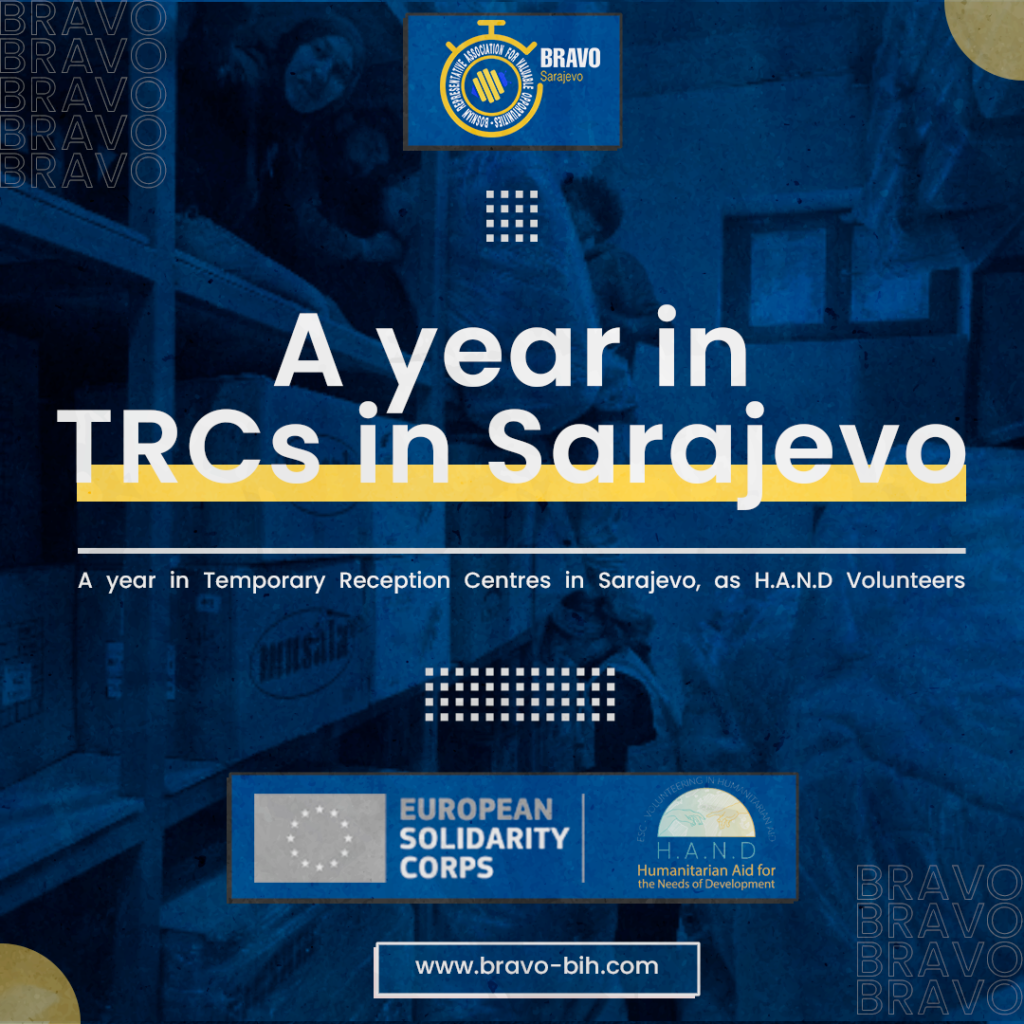
For the past six months, a group of young volunteers has been volunteering in Sarajevo’s Temporary Reception Centers (TRCs) to assist migrants and refugees. These centers, Blažuj and Ušivak, provide shelter and support for people who have left their homes in search of safety, opportunities, and a better future.
Temporary Reception Centers (TRCs) are facilities designed to provide temporary housing and essential services to migrants and refugees. In Sarajevo, there are two major TRCs:
- Blažuj TRC:This center is located in the municipality of Ilidža and is the largest in the area. It mainly houses single men over the age of 18.
- Ušivak TRC:Found in the Hadžići municipality, this center accommodates families, unaccompanied minors, and other vulnerable groups. Men are only allowed here if they are accompanying their wives and/or children.
These centers serve as a safe place for people who are often on long and dangerous journeys. Here, they receive basic necessities like food, clothing, and shelter, as well as medical and psychological support.
The Role of Volunteers
Volunteers in the H.A.N.D. project (Humanitarian Aid for the Needs of Development) have been key players in helping TRCs run smoothly. Some of the activities that they were conducting are:
- Helping with Registration
When new arrivals come to the centers, the first step is registration. Volunteers assist by:
- Translating information into different languages, such as Arabic and French.
- Explaining the center’s rules and services, like meal times and hygiene facilities.
- Helping individuals understand and sign registration documents.
The registration process is very important as it ensures that everyone receives an ID card. This card allows them to access vital services like food, laundry, and social activities.
- Distributing Essentials
Volunteers play an important role in providing newcomers with welcome packages, which include clothing, hygiene items, and blankets. In the warehouse, they:
- Sort and prepare these packages.
- Keep track of inventory to make sure nothing runs out.
- Organize donations and ensure that items reach those who need them most.
- Maintaining Cleanliness
Keeping living spaces clean and safe is another important task, which our volunteers helped with:
- Distributing cleaning supplies to residents.
- Organizing regular cleaning of accommodation units.
- Informing residents about health and hygiene practices, especially before events like bed bug treatments.
These kind of tasks are there to create a more comfortable and healthy environment for everyone.
- Providing Social and Emotional Support
Life in a TRC is often challenging, so creating a sense of community is very important. Our volunteers through they work organized and participated in activities such as:
- Workshops and creative sessions in the social corner, where residents can play games, drink tea, or share their stories.
- Celebrating special occasions with themed activities, helping residents feel a sense of normalcy.
- Translating during medical consultations to ensure residents understand their treatment plans.
Challenges that our volunteers were facing
Volunteers in TRCs is rewarding but not without its challenges. Volunteers are oftenly facing with:
- Language Barriers:Because many residents speak Arabic, Farsi, or other languages. Volunteers use their language skills or rely on creative communication methods to bridge the language gap.
- Emotional Tension:Hearing heartbreaking stories of loss and struggle can be difficult. Volunteers must be equipped with essentials skills such as resilience and empathy to support residents while managing their own emotions.
How our volunteers are making significant changes in the TRCs?
Despite these challenges, the impact of volunteer work is clear. From helping a father find hope in a creative sewing project to supporting unaccompanied minors through hard life transitions, volunteers are bringing compassion and stability, helping them to bridge the difficult times. One example is the No Nation Fashion project in Ušivak TRC, where residents design and create clothing, showcasing their skills and finding joy in creativity.
Our volunteers are also helping with residents navigate their journeys, whether it’s seeking asylum, reuniting with family, or planning for a brighter future. Efforts of our volunteers embody the spirit of solidarity, showing that even small actions can make a big difference.
Final Thoughts
The volunteering of ESC H.A.N.D. volunteers in Sarajevo’s TRCs is more than providing services; it’s about building connections and restoring dignity to people in vulnerable situations. By creating safe spaces, listening to stories, and offering practical help, these young volunteers are truly transforming lives – including their own.
For anyone inspired by this story, consider volunteering or supporting humanitarian projects in your community. Together, we can continue to make the world a better place for everyone – make the world wonder.
